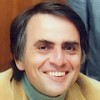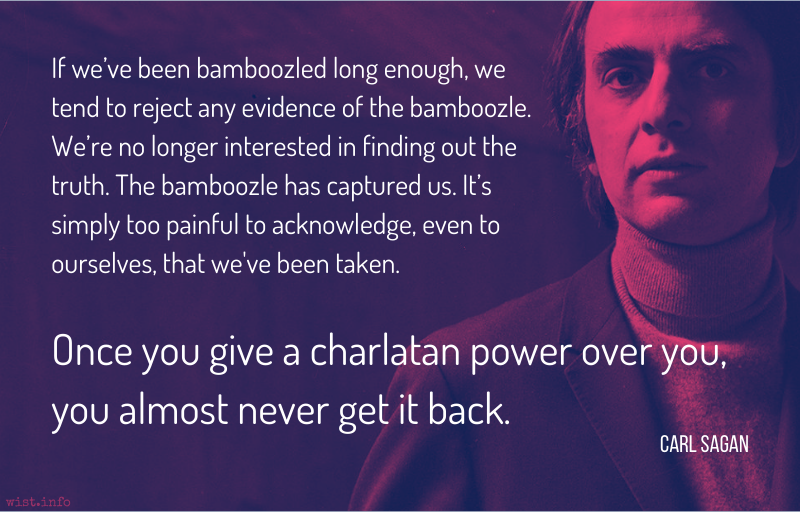The world is so exquisite with so much love and moral depth, that there is no reason to deceive ourselves with pretty stories for which there’s little good evidence. Far better it seems to me, in our vulnerability, is to look death in the eye and to be grateful every day for the brief but magnificent opportunity that life provides.
Quotations by:
Sagan, Carl
It seems to me what is called for is an exquisite balance between two conflicting needs: the most skeptical scrutiny of all hypotheses that are served up to us and at the same time a great openness to new ideas. Obviously those two modes of thought are in some tension. But if you are able to exercise only one of these modes, whichever one it is, you’re in deep trouble.
If you are only skeptical, then no new ideas make it through to you. You never learn anything new. You become a crotchety old person convinced that nonsense is ruling the world. (There is, of course, much data to support you.) But every now and then, maybe once in a hundred cases, a new idea turns out to be on the mark, valid and wonderful. If you are too much in the habit of being skeptical about everything, you are going to miss or resent it, and either way you will be standing in the way of understanding and progress.
On the other hand, if you are open to the point of gullibility and have not an ounce of skeptical sense in you, then you cannot distinguish useful ideas from the worthless ones. If all ideas have equal validity then you are lost, because then, it seems to me, no ideas have any validity at all.
Carl Sagan (1934-1996) American scientist and writer
“The Burden of Skepticism,” Pasadena lecture (1987)
(Source)
Reprinted in The Skeptical Inquirer (Fall 1987).
The truth may be puzzling. It may take some work to grapple with. It may be counterintuitive. It may contradict deeply held prejudices. It may not be consonant with what we desperately want to be true. But our preferences do not determine what’s true. We have a method, and that method helps us to reach not absolute truth, only asymptotic approaches to the truth — never there, just closer and closer, always finding vast new oceans of undiscovered possibilities.
Carl Sagan (1934-1996) American scientist and writer
“Wonder and Skepticism,” Skeptical Enquirer (Jan-Feb 1995)
Somewhere, something incredible is waiting to be known.
Carl Sagan (1934-1996) American scientist and writer
(Spurious)
The words come from a profile of Sagan, "Seeking Other Worlds," Newsweek (15 Aug 1977). The final paragraph reads:“A serious search with negative results says something of profound importance,” Sagan argues. “We discover there’s something almost forbidden about life ... if it turns out we really are alone.” But clearly, Sagan is looking for a happier result. There may be no galumphing green Barsoomian giants to satisfy the fantasies of a romantic Brooklyn boy. But no doubt, there are even stranger discoveries to be made ... some totally new phenomenon perhaps ... Somewhere, something incredible is waiting to be known.
Those final words, not a quotation, have been broadly mistaken for an actual statement by Sagan.
Sharon Begley, one of the writers of the article, has confirmed the words are hers.
Sagan's daughter , Sasha Sagan, has also disavowed the quotation, noting that her father would never have used "incredible" in such a context, as the word literally means "not credible."
More discussion: Somewhere, Something Incredible Is Waiting To Be Known – Quote Investigator®.
Widespread intellectual and moral docility may be convenient for leaders in the short term, but it is suicidal for nations in the long term. One of the criteria for national leadership should therefore be a talent for understanding, encouraging, and making constructive use of vigorous criticism.
But the fact that some geniuses were laughed at does not imply that all who are laughed at are geniuses. They laughed at Columbus, they laughed at Fulton, they laughed at the Wright brothers. But they also laughed at Bozo the Clown.
Carl Sagan (1934-1996) American scientist and writer
Broca’s Brain (1980)
Also attrib. to Martin Gardner and Michael Shermer. Discussion.
DRUMLIN: I know you must think this is all very unfair. Maybe that’s an understatement. What you don’t know is I agree. I wish the world was a place where fair was the bottom line, where the kind of idealism you showed at the hearing was rewarded, not taken advantage of. Unfortunately, we don’t live in that world.
ARROWAY: Funny, I’ve always believed that the world is what we make of it.
Carl Sagan (1934-1996) American scientist and writer
Contact, novel (1997) [film screenplay by J. Hart and M. Goldenberg]
(Source)
Extraordinary claims require extraordinary evidence.
Carl Sagan (1934-1996) American scientist and writer
Cosmos (1980)
Parallels a comment by Marcello Truzzi, "Extraordinary claims require extraordinary proof."
Human history can be viewed as a slowly dawning awareness that we are members of a larger group. Initially our loyalties were to ourselves and our immediate family, next, to bands of wandering hunter-gatherers, then to tribes, small settlements, city-states, nations. We have broadened the circle of those we love. We have now organized what are modestly described as super-powers, which include groups of people from divergent ethnic and cultural backgrounds working in some sense together — surely a humanizing and character building experience. If we are to survive, our loyalties must be broadened further, to include the whole human community, the entire planet Earth.
The choice is with us still, but the civilization now in jeopardy is all humanity. As the ancient myth makers knew, we are children equally of the earth and the sky. In our tenure of this planet we’ve accumulated dangerous evolutionary baggage — propensities for aggression and ritual, submission to leaders, hostility to outsiders — all of which puts our survival in some doubt. But we’ve also acquired compassion for others, love for our children and desire to learn from history and experience, and a great soaring passionate intelligence — the clear tools for our continued survival and prosperity. Which aspects of our nature will prevail is uncertain, particularly when our visions and prospects are bound to one small part of the small planet Earth. But up there in the cosmos, an inescapable perspective awaits.
A book is made from a tree. It is an assemblage of flat, flexible parts (still called “leaves”) imprinted with dark pigmented squiggles. One glance at it and you hear the voice of another person, perhaps someone dead for thousands of years. Across the millennia, the author is speaking, clearly and silently, inside your head, directly to you.
Writing is perhaps the greatest of human inventions, binding together people, citizens of distant epochs, who never knew one another. Books break the shackles of time, proof that humans can work magic.
Carl Sagan (1934-1996) American scientist and writer
Cosmos, ch. 11 “The Persistence of Memory” (1980)
(Source)
I think the health of our civilization, the depth of our awareness about the underpinnings of our culture, and our concern for the future can all be tested by how well we support our libraries.
Carl Sagan (1934-1996) American scientist and writer
Cosmos, ch. 11 “The Persistence of Memory” (1980)
(Source)
Our posturings, our imagined self-importance, the delusion that we have some privileged position in the Universe:, are challenged by this point of pale light. Our planet is a lonely speck in the great enveloping cosmic dark. In our obscurity, in all this vastness, there is no hint that help will come from elsewhere to save us from ourselves.
Humans may crave absolute certainty; they may aspire to it; they may pretend, as partisans of certain religions do, to have attained it. But the history of science — by far the most successful claim to knowledge accessible to humans — teaches that the most we can hope for is successive improvement in our understanding, learning from our mistakes, an asymptotic approach to the Universe, but with the proviso that absolute certainty will always elude us.
In the way that scepticism is sometimes applied to issues of public concern, there is a tendency to belittle, to condescend, to ignore the fact that, deluded or not, supporters of superstition and pseudoscience are human beings with real feelings, who, like the sceptics, are trying to figure out how the world works and what our role in it might be. Their motives are in many cases consonant with science. If their culture has not given them all the tools they need to pursue this great quest, let us temper our criticism with kindness. None of us comes fully equipped.
In a life short and uncertain, it seems heartless to do anything that might deprive people of the consolation of faith when science cannot remedy their anguish. Those who cannot bear the burden of science are free to ignore its precepts. But we cannot have science in bits and pieces, applying it where we feel safe and ignoring it where we feel threatened — again, because we are not wise enough to do so.
Think of how many religions attempt to validate themselves with prophecy. Think of how many people rely on these prophecies, however vague, however unfulfilled, to support or prop up their beliefs. Yet has there ever been a religion with the prophetic accuracy and reliability of science? … No other human institution comes close.
One of the saddest lessons of history is this: If we’ve been bamboozled long enough, we tend to reject any evidence of the bamboozle. We’re no longer interested in finding out the truth. The bamboozle has captured us. It’s simply too painful to acknowledge, even to ourselves, that we’ve been taken. Once you give a charlatan power over you, you almost never get it back.
Carl Sagan (1934-1996) American scientist and writer
The Demon-Haunted World, ch. 13 (1995)
(Source)
Have I ever heard a skeptic wax superior and contemptuous? Certainly. I’ve even sometimes heard, to my retrospective dismay, that unpleasant tone in my own voice. There are human imperfections on both sides of this issue. Even when it’s applied sensitively, scientific skepticism may come across as arrogant, dogmatic, heartless and dismissive of the feelings and deeply held beliefs of others. And, it must be said, some scientists and dedicated skeptics apply this tool as a blunt instrument, with little finesse. Sometimes it looks as if the skeptical conclusion came first, that contentions were dismissed before, not after, the evidence was examined. All of us cherish our beliefs. They are, to a degree, self-defining. When someone comes along who challenges our belief system as insufficiently well based — or who, like Socrates, merely asks embarrassing questions that we haven’t thought of, or demonstrates that we’ve swept key underlying assumptions under the rug — it becomes much more than a search for knowledge. It feels like a personal assault.
Carl Sagan (1934-1996) American scientist and writer
The Demon-Haunted World, ch. 17 (1995)
(Source)
Who is more humble? The scientist who looks at the universe with an open mind and accepts whatever the universe has to teach us, or somebody who says everything in this book must be considered the literal truth and never mind the fallibility of all the human beings involved?
Carl Sagan (1934-1996) American scientist and writer
Interview, The Charlie Rose Show (27 May 1996)
In science it often happens that scientists say, “You know that’s a really good argument; my position is mistaken,” and then they would actually change their minds and you never hear that old view from them again. They really do it. It doesn’t happen as often as it should, because scientists are human and change is sometimes painful. But it happens every day. I cannot recall the last time something like that happened in politics or religion.


